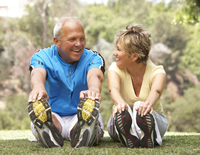By Mardy Chizek, RN, FNP, BSN, MBA, AAS
 Eldercare Navigator Advocates that Preventing Home Falls Reduces ER Visits and Healthcare Costs
Eldercare Navigator Advocates that Preventing Home Falls Reduces ER Visits and Healthcare Costs
The Journal of the American Geriatrics Society found that falls among the elderly are common, with as many as 40% of people age 65 and older falling each year, often resulting in hip fractures or concussions. An estimated 25%-75% of those who are independent before a hip fracture can neither walk independently nor achieve their previous level of independent living within one year following their fracture. Most alarming is that between 18%-33% of older hip fracture patients die within 1 year of their fracture.
The Centers for Disease Control and Prevention estimates that in 2000, the total direct cost of all fall injuries for people 65 and older exceeded $19 billion. The financial toll for older adult falls is expected to increase as the population ages, and may reach $54.9 billion by 2020 (adjusted to 2007 dollars).
“Aging is not an automatic cause for falls in the home. Falls among seniors are usually associated with dizziness and balance problems attributed to lack of exercise, medications, failing eyesight, Vitamin D deficiency and hazards in the home,” says Mardy Chizek, an RN and an Eldercare Navigator with Charism Eldercare Service in Westmont, Illinois..
Following are the five most common steps to take to prevent at-home falls:
1. Using medication incorrectly may lead to dizziness, so be especially aware of medication changes and talk with your doctor about symptoms.
2. More than 75 percent of people suffering with dizziness/vertigo have an inner ear (vestibular) disorder which can be corrected without medication.
3. Have your eyes checked by an eye doctor. You may be wearing the wrong glasses or have a condition such as glaucoma or cataracts that limits your vision. Poor vision can increase your chances of falling.
 4. Exercise is one of the most important ways to reduce your chances of falling. It makes you stronger and helps you feel better. While all exercise is not equal where balance is concerned, exercise makes you stronger and helps you feel better. Challenge your balance by walking around the house or yard barefooted, or even learn Tai-Chi.
4. Exercise is one of the most important ways to reduce your chances of falling. It makes you stronger and helps you feel better. While all exercise is not equal where balance is concerned, exercise makes you stronger and helps you feel better. Challenge your balance by walking around the house or yard barefooted, or even learn Tai-Chi.
5. To make your home safer, remove obstacles that may cause falls (cords, non-anchored rugs, etc.), use grab bars in the bathroom, improve lighting, and wear shoes with good support and non-slip soles.
“I’m often called into a home to conduct a falls assessment so I can eliminate barriers that may contribute to a fall. I also work with seniors and family caregivers to teach them proper techniques for improving balance and preventing falls,” adds Chizek.
– For more information on making informed decisions about dementia care, visit Mardy Chizek and Charism Elder Care Services on-line at www.charism.net.
